#afghanistan pakistan clashes
Explore tagged Tumblr posts
Link
0 notes
Text
Authorities in northwestern Pakistan announced Wednesday that heavily armed rival Sunni and Shiite Muslim tribes in a conflict-prone district bordering Afghanistan have reached a peace deal following recent deadly clashes.
A traditional grand assembly of tribal elders mediated the agreement between the warring sides in the Kurram district of Khyber Pakhtunkhwa province, where years-old land disputes have often led to deadly districtwide sectarian clashes, a provincial government spokesperson said in a late-night statement.
“Both sides have agreed to demolish their bunkers and surrender their heavy weapons to authorities,” Muhammad Ali Saif said in a post on X. He stated that anyone found guilty of violating the pact's terms would be apprehended and punished in line with local traditions.
2 notes
·
View notes
Text
Modi’s Pm Tenure Is the Second Longest Tenure in the History of India.
PM Modi took the oath of pm along with 72 cabinet members
Modi 3.0
The rumble of the pm post came to an end after pm Modi became the third consecutive prime minister of India. There were rumours like I.N.D.I.A bloc to make Nitish Kumar the PM of India but the offer was not accepted by Nitish Kumar hence last night Modi became the pm.
But as the many changes happen in the movie more changes happened in the Indian election there were ups and downs once it was looking like the I.N.D.I.A bloc was going to sweep the election but the fate of Modi was good at this time Chandra Babu Pawan Kalyan also Nitish Kumar scored well and hence were offered to became deputy prime minister of INDIA which was shocking but things did not happen as per Congress term.
PM Modi now has taken the oath of PM and has started his duty but will the government be strong as a diamond till 2029 or it will dissolve like butter?
We have seen what Triple Alliance has done in the state of Maharashtra.
Inter Politics of India
From 2014 till 2023 no one in the country could challenge the BJP because of its strong ideology of Hindutva and leadership of MODI but after the result of 2024.
The Modi wave has been downed by the current situation the ideology of Hindutva has also been which was extremely booming but why God knows due to the tactics played by the centre have not positively affected the states of India and mostly the people of India don’t’ like such type of politics? That could be the reason.
The centre’s policy to look upon Gujrat development is also not liked by the people of India specially the state people of Maharashtra, and Tamil Nadu, because the growth of these states has simultaneously been reducing as Maharashtra’s GDP should have been positive but due to the new leadership of Maharashtra it has been fall and matter got worse after 17 tech companies of Pune left Maharashtra.
Seems the state election is going to soon happen in Maharashtra and the rumble will be on for the most prosperous state of Maharashtra whose GDP is more than Pakistan.
Geo Politics Around India
The South Asia group of Nations called ASEAN is now dead as the entry of PLA (people’s Liberation Army of China) & U.S.A. in the politics of Bhutan, Myanmar, Maldives, Nepal, Sri Lanka, and Pakistan only Bangladesh has been pro-India. In such a situation, India also has to develop its own naval fleet.
India has developed in the past decade since Andaman & Nicobar Island is India’s best asset government of India has mainly developed these islands as a naval fleet to keep an eye on China’s trade and especially the presence of China’s navy in the Indian Ocean. And also, for Pakistan which has become a close ally of China these days.
In the Persian Gulf India has made its two allies Iran & Afghanistan which are contemporary enemies of Pakistan.
If we move towards the Arabian region India has maintained great relations with Saudi Arabia, Israel, and Oman which are contemporary trade partners, and especially Oman which is the doorway for India to do trade with the other nations of Arab nations.
Central Asia
If we move up towards central Asia India has to maintain special relations with Tajikistan as India has its air base in Tajikistan.
Other central nations have maintained neutrality in the context of Indo-central relations.
RUSSIA
If we look at the past century Russia is one of the closest and most trustworthy allies. This is positive to India as the current political scenario Russia is more towards China as China provides Trade and other needs to Russia as it is affected by the restrictions put by the West & U.S.A.
Russia signed the same treaty with China as India in 1971 as a treaty of peace and cooperation. The same treaty was signed by Russia and India in the 1971 war but there is a loop.
The relationship between China and Russia has not been good since the issue of the Mussoorie River clash in 1969 hence China is a trade partner of Russia not of trusted partner.
Korean peninsula
The Korean peninsula conflict is since WW2 but India has maintained a balance and good relations with South Korea & North Korea and India has developed the tech trade with South Korea and Japan.
Japan is becoming the new military as well as a tech partner with India. India is going to operate a military base in Japan both sides bilateral talks were conducted at the 13th Japan Summit.
South East Asia
Southeast Asia and India relations have been very negative since the independence, also during the 1964 Indo-Pak war Indonesia was in full support of Pakistan and was ready to attack India but due to the maintenance of Indian armed troops in Andaman and Nicobar, the problem was swept.
India has historically traded with South East Asia during the time of Rajendra Chola who was one of the greatest kings of India. Now the situation is different the countries of Southeast Asia are ready to trade with India but due to the military coup in Myanmar and China’s dominance in the South China Sea, it is becoming difficult for India to trade with Southeast Asia.
As for handling National & International politics India’s current situation needs a strong leader who should be the next prime minister
MODI OR RAHUL GANDHI?

2 notes
·
View notes
Text
Exclusive: Imran Khan on His Plan to Return to Power
— By Charlie Campbell | April 3, 2023 | Time Magazine
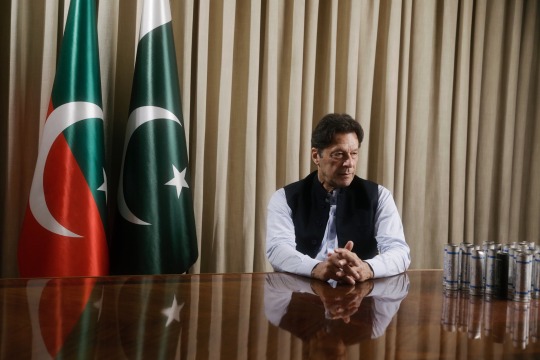
Former Pakistan Prime Minister Imran Khan sits for a portrait in his Lahore residence on March 28. Next to Khan are tear gas canisters he says were thrown at his house. Umar Nadeem for Time Magazine
Political leaders often boast of inner steel. Imran Khan can point to three bullets dug out of his right leg. It was in November that a lone gunman opened fire on Khan during a rally, wounding the 70-year-old as well as several supporters, one fatally. “One bullet damaged a nerve so my foot is still recovering,” says the former Pakistani Prime Minister and onetime cricket icon. “I have a problem walking for too long.”
If the wound has slowed Khan, he doesn’t show it in a late-March Zoom interview. There is the same bushy mane, the easy laugh, prayer beads wrapped nonchalantly around his left wrist. But in the five years since our last conversation, something has changed. Power—or perhaps its forfeiture—has left its imprint. Following his ouster in a parliamentary no-confidence vote in April 2022, Khan has mobilized his diehard support base in a “jihad,” as he puts it, to demand snap elections, claiming he was unfairly toppled by a U.S.-sponsored plot. (The State Department has denied the allegations.)
The actual intrigue is purely Pakistani. Khan lost the backing of the country’s all-powerful military after he refused to endorse its choice to lead Pakistan’s intelligence services, known as ISI, because of his close relationship with the incumbent. When Khan belatedly greenlighted the new chief, the opposition sensed weakness and pounced with the no-confidence vote. Khan then took his outrage to the streets, with rallies crisscrossing the nation for months.
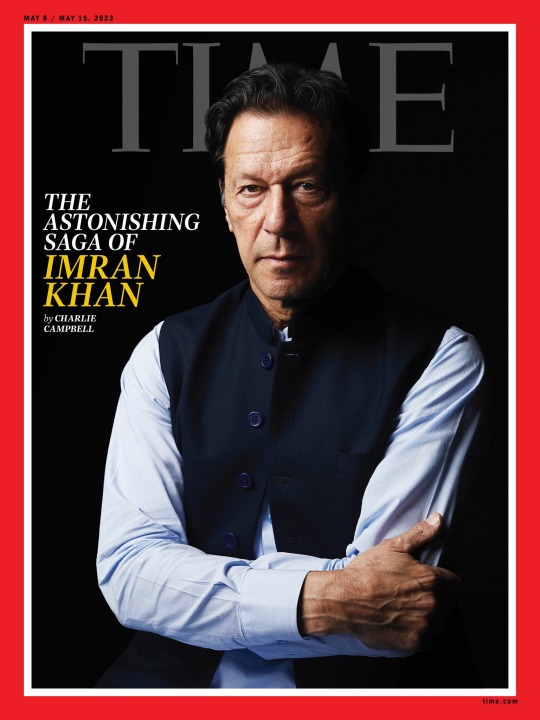
Photograph by Umar Nadeem for Time Magazine
“Imran Khan can communicate with all strata of society on their level,” says Shaheena Bhatti, 63, a professor of literature in Rawalpindi. “The other politicians are … not going to do anything for the country because they’re only in it for themselves.”
The November attack on Khan’s life only intensified the burning sense of injustice in members of his Pakistan Tehreek-e-Insaf party, or PTI, who have since clashed with police in escalating street battles involving slingshots and tear gas. Although an avowed religious fanatic was arrested for the shooting, Khan continues to accuse an assortment of rival politicians of pulling the strings: incumbent Prime Minister Shehbaz Sharif—brother of Khan’s longtime nemesis, former Prime Minister Nawaz Sharif—as well as Interior Minister Rana Sanaullah and Major General Faisal Naseer. (All have denied the accusation.)
In addition to bullets, Khan has also been hit by charges—143 over the past 11 months, by his count, including corruption, sedition, blasphemy, and terrorism—which he claims have been concocted in an attempt to disqualify him from politics. After Sharif’s cabinet declared on March 20 that the PTI was “a gang of militants” whose “enmity against the state” could not be tolerated, police arrested hundreds of Khan supporters in raids.
“Either Imran Khan exists or we do,” Interior Minister Sanaullah said on March 26.
Pakistan sometimes seems to reside on a precipice. Its current political instability comes amid devastating floods, runaway inflation, and resurgent cross-border terrorist attacks from neighboring Afghanistan that together threaten the fabric of the nation of 230 million. It’s a country where rape and corruption are rife, and the economy hinges on unlocking a stalled IMF bailout, Pakistan’s 22nd since independence in 1947. Inflation soared in March to 47% year-over-year; the prices of staples such as onions rose by 228%, wheat by 120%, and cooking gas by 108%. Over the same period, the rupee has plummeted by 54%.
“Ten years ago, I earned 10,000 rupees a month [$100] and I wasn’t distressed,” says Muhammad Ghazanfer, a groundsman and gardener in Rawalpindi. “With this present wave of inflation, even though I now earn 25,000 [$90 today] I can’t make ends meet.” The world’s fifth most populous country has only $4.6 billion in foreign reserves—$20 per citizen. “If they default, and they can’t get oil, companies go bust, and people don’t have jobs, you would say this is a country ripe for a Bolshevik revolution,” says Cameron Munter, a former U.S. ambassador to Pakistan.
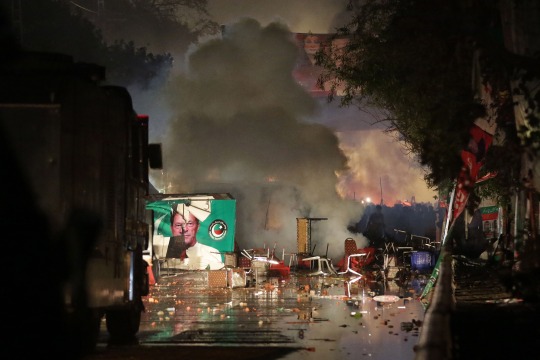
Police fired teargas to disperse the supporters of the former Prime Minister as they tried to arrest Khan in Lahore, Pakistan, on March 14. Hundreds of Tehrik-e-Insaf supporters clashed with riot police as they reached Khan's residence. Rahat Dar—EPA-EFE/Shutterstock
“Our economy has gone into a tailspin,” says Khan. “We now have the worst economic indicators in our history.” The situation threatens to send the nuclear-armed country deeper into China’s orbit. Yet sympathy is slim in a West put off by Khan’s years of anti-American bluster and cozying up to autocrats and extremists, including the Taliban. He calls autocratic Turkish President Recep Tayyip Erdogan “my brother” and visited Russian President Vladimir Putin in Moscow on the eve of the Ukraine invasion, remarking on “so much excitement.” Khan can both repeatedly declare Osama bin Laden a “martyr” and praise Beijing’s confinement of China’s Uighur Muslim minority. He has obsessed on Joe Biden’s failure to call him after entering the White House. “He’s someone that is imbued with this incredibly strong sense of grievance,” says Michael Kugelman, the deputy director of the Asia Program at the Woodrow Wilson Center.
Yet Khan can legitimately claim to have democracy on his side, with poll numbers suggesting he is a shoo-in to return to power if the elections he demands happen. “His popularity has skyrocketed,” says Samina Yasmeen, director of the Centre for Muslim States and Societies at the University of Western Australia. “No matter what he says, even if it’s irrational, the reality is that people are angry and taken by his message.”
“Imran Khan is the best bet we have right now,” says Osama Rehman, 50, a telecommunications engineer in Islamabad. “If [he] is arrested or disqualified, people will come out onto the street.”
The state appears to flirt with the idea. Police raids on Khan’s home in the Punjab province capital of Lahore in early March left him choking on tear gas, he says, as supporters brandishing sticks battled police in riot gear before makeshift barricades of sandbags and iron rods. “This sort of crackdown has never taken place in Pakistan,” says Khan. “I don’t know even if it was as bad under martial law.”
After Khan left his compound to appear in court on March 18, traveling in an armored SUV strewn with flower petals and flanked by bodyguards, the police swooped in while his wife was home, he says, beating up servants and hauling the family cook off to jail. He claims another assassination attempt awaited inside the Islamabad Judicial Complex, which was “taken over by the intelligence agencies and paramilitary.”
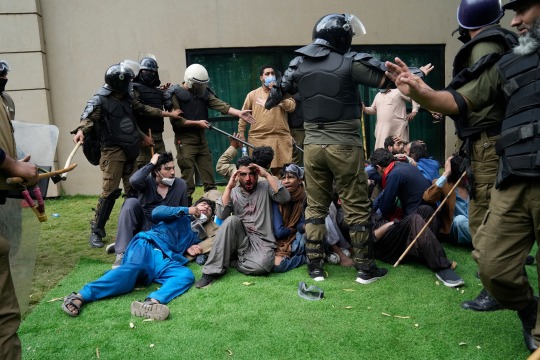
Police arrested 61 supporters of former Prime Minister Imran Khan during a search operation near Khan’s residence, in Lahore, Pakistan, on March 18, 2023. K.M. Chaudary—AP
The confrontation could remain in the streets indefinitely. Prime Minister Sharif has rejected Khan’s demand for a snap election, saying polls would be held as scheduled in the fall. But “every narrative is being built up [for the government] to justify postponing the elections,” says Yasmeen. On March 22, Pakistan’s Election Commission delayed local balloting in Punjab, the country’s most populous province, from April 30 until Oct. 8.
“Political stability in Pakistan comes through elections,” Khan points out. “That is the starting point for economic recovery.” From the U.S. perspective, he may be far from the ideal choice to helm an impoverished, insurgency-racked Islamic state. But is he the only person that can hold the country together?
“Never has one man scared the establishment … as much as right now,” says Khan. “They worry about how to keep me out; the people how to get me back in.”
It’s indicative of Pakistan’s malaise that its most popular politician in decades sits barricaded at home. But the nation has always been beyond comparison—a wedge of South Asia that begins in the shimmering Arabian Gulf and ascends to its Himalayan heights. It’s the world’s largest Islamic state, though governed for half its history by men in olive-green uniforms, who continue to act as ultimate arbiters of power.
The only boy of five children, Khan was born Oct. 5, 1952 to an affluent Pashtun family in Lahore. He studied politics, philosophy, and economics at Oxford University, and it was in the U.K. that he first played cricket for Pakistan, at age 18. Britain’s sodden terrain also provided the backdrop to his political awakening.
“When I arrived in England our country had been ruled by a military dictator for 10 years; the powerful had one law, the others were basically not free human beings,” he says. “Rule of law actually liberates human beings, liberates potential. This was what I discovered.”
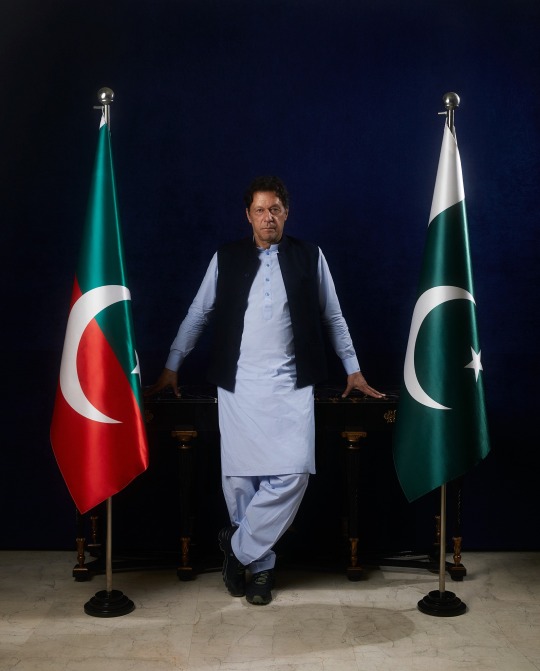
Khan in his Lahore residence on March 28. Umar Nadeem for Time Magazine
On the cricket pitch, Khan was a talisman who knitted together mercurial talents and journeymen into a cohesive whole, a team that overcame extraordinary odds to famously lift the Cricket World Cup in 1992. There were glimpses of these qualities when Khan rose to become Prime Minister: running on an anti-graft ticket, he fused a disparate band of students and workers, Islamic hard-liners, and the nation’s powerful military to derail the Sharif political juggernaut. His crowning achievement remains the Shaukat Khanum Cancer Hospital in Lahore, which he opened in 1994 in memory of his mother, who succumbed to the disease. It is the largest cancer hospital serving Pakistan’s impoverished, boosting Khan’s administrative credentials.
Khan spent 22 years in the political wilderness before his 2018 election triumph. But once in power, the self-styled bold reformer turned unnervingly divisive. Opposition is easier than government, and Khan found himself bereft of ideas and besieged by unsavory partners, even kowtowing to the now-banned far-right party Tehreek-e-Labbaik Pakistan despite its support for the extrajudicial killing of alleged blasphemers. There were some successes: Pakistan received praise for its handling of the pandemic, with deaths per capita just a third that of neighboring India. His “Ten Billion Tree Tsunami” reforestation drive was popular, as was the 2019 return of international test cricket, the most prestigious form of the game, following a terrorist attack on the Sri Lankan team and a decade-long hiatus.
Khan’s private life has rarely been out of the headlines. His first wife was British journalist and society heiress Jemima Khan, née Goldsmith, a close friend of Diana, Princess of Wales. She converted to Islam for their wedding, though the pair divorced in 2004 after nine years of marriage, and her family’s Jewish heritage was political dynamite. (The couple’s two sons live in London.) Khan’s second marriage to British-Pakistani journalist Reham Khan lasted nine months. According to a 1997 California court ruling, Khan also has one child, a daughter, born out of wedlock, and he’s struggled to quash gossip of several more. In 2018, six months before he took office, he married his current wife, Bushra Bibi Khan, a religious conservative who is believed to be the only Pakistan First Lady to wear the full-face niqab shawl in public.
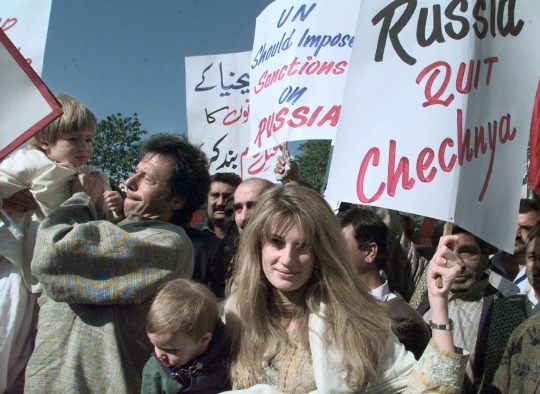
Khan, left, lifts elder son Suleman while his ex-wife Jemima carries younger son Qasim during a march towards the U.N. offices in Islamabad in 1999. The Khans led some 100 demonstrators in an anti-Russian rally protesting against attacks in Chechnya. Reuters
It all fed Khan’s legend: the debonair playboy who grew devout; the privileged son who rails against the corrupt; the humanist who stands with the bloodthirsty. His youth was spent carousing with supermodels in London’s trendiest nightspots. But his politics has hardened as his handsome features have lined and leathered. He provoked outrage when in August 2021 he said the Taliban had “broken the shackles of slavery” by taking back power (he insists to TIME he was “taken out of context”) and has made various comments criticized as misogynistic. When asked about the drivers of sexual violence in Pakistan, he said, “If a woman is wearing very few clothes, it will have an impact on the men, unless they’re robots.” Khan has refused to condemn Putin’s invasion, insisting, like China, on remaining “neutral” and deflecting uncomfortable questions onto supposed double standards regarding India’s inroads into disputed Kashmir. “Morality in foreign policy is reserved for powerful countries,” he says with a shrug.
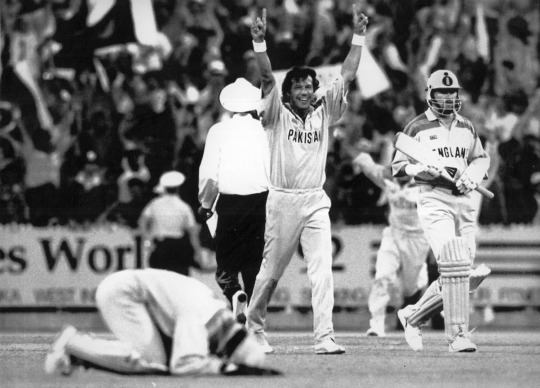
Khan in the 1992 Cricket World Cup. Pakistan won under Khan's captaincy this year. Fairfax Media
At the same time, Khan’s ideological flexibility has not stretched to compromises with opponents. He claims it was the military’s unwillingness to go after Pakistan’s influential “two families”—those of Sharif and the Bhutto clan of former Prime Ministers Zulfikar and Benazir—for alleged corruption that caused his relationship with the generals to fray. “If the ruling elite plunders your country and siphons off money, and you cannot hold them accountable, then that means there is no rule of law,” he says.
Yet analysts say that it was Khan’s relentless taunting of the U.S. that torpedoed his relationship with the military, which remains much more interested in retaining good relations with Washington. To journalists and supporters, he has accused the U.S. of imposing a “master-slave” relationship on Pakistan and of using it like “tissue paper.” To TIME, he insists that “criticizing U.S. foreign policy does not make you anti-American.” Still, by 2022, the generals no longer had his back. The common perception among Pakistan watchers is that Khan’s fleeting political success was owed to a Faustian pact with the nation’s military and extremist groups that shepherded his election victory and he is now reaping the whirlwind.
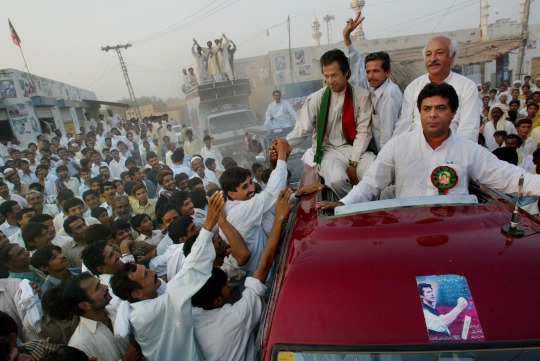
Cricket captain turned politician Imran Khan shakes hands with supporters during a rally in October 2002 in Shadi Khal, Pakistan. Paula Bronstein—Getty Images
He appears to relish in the perceived injustice, the walls closing in. On March 25, Khan addressed thousands of supporters in central Lahore from a bulletproof box above a green-and-red flag with the initials of his PTI emblazoned on a cricket bat—once Khan’s weapon of choice, though now he wields words with similar potency.
“I know you have decided you wouldn’t allow Imran Khan back in power,” he said. “That’s fine with me. But do you have a plan or know how to get the country out of the current crisis?”
If Pakistan’s economic woes are reaching a new nadir, the trajectory was established during Khan’s term. A revolving door of Finance Ministers was compounded by bowing to hardliners. (After appointing renowned Princeton economist Atif Mian as an adviser, Khan fired him just days later owing to a backlash from Islamists because Mian is an Ahmadi, a sect of Islam they consider heretics.) In 2018, Khan pledged not to follow previous administrations’ “begging bowl” tactics of foreign borrowing, in order to end Pakistan’s cycle of debt. But less than a year later, he struck a deal with the IMF to cut social and development spending while raising taxes in exchange for a $6 billion loan. Mismanagement exacerbated global headwinds from the pandemic and soaring oil prices.
Meanwhile, little was done to address Pakistan’s fundamental structural issues: few people pay tax, least of all the feudal landowners who control traditional low-added-value industries like sugar farms, textile mills, and agricultural interests while wielding huge political-patronage networks stemming from their workers’ votes. In 2021, only 2.5 million Pakistanis filed tax returns—less than 1% of the adult population. “People don’t pay tax, especially the rich elite,” says Khan. “They just siphon out money and launder it abroad.”
Instead, Pakistan has relied on foreign money to balance a budget and provide government services. The U.S. funneled nearly $78.3 billion to Pakistan from 1948 to 2016. But in 2018, President Trump ended the $300 million security assistance that the U.S. provided annually. Now Pakistan must shop around for new benefactors—chiefly Saudi Arabia, Russia, and China. When Khan visited Putin last February, it was to arrange cheap oil and wheat imports and discuss the $2.5 billion Pakistan Stream gas pipeline, which Moscow wants to build between Karachi and Kasur. More recently, China has stepped in. In early March, the Industrial and Commercial Bank of China approved a $1.3 billion loan rollover—a fiscal bandaid for a gaping wound.
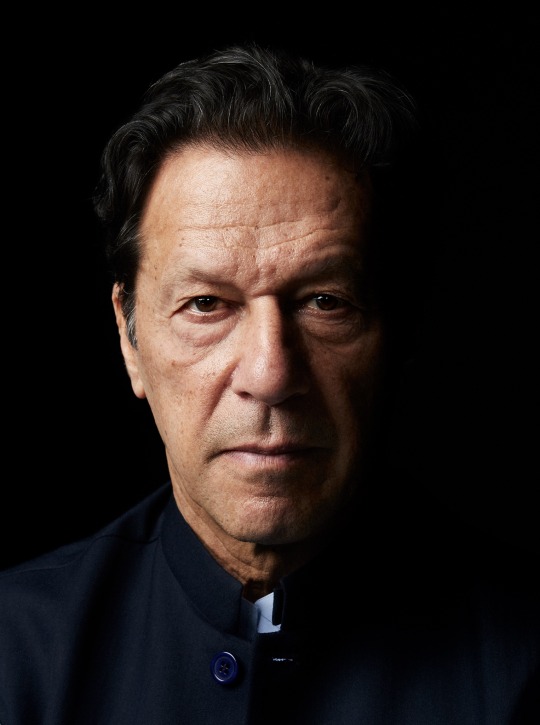
Khan in his Lahore residence on March 28. Umar Nadeem for Time Magazine
But if Khan recognized the problem, he did little to solve it. After his election in 2018, he was in an uncommonly strong position with the backing of the military and progressives, as well as the tolerance of the Islamists. Now, with all the bad blood and open warfare among these factions, even if he claws his way back, “he’ll be in a weaker position to actually effect any reforms,” says Munter, the former U.S. ambassador, “if he had any reforms to begin with.”
When asked for his step-by-step plan to get Pakistan back on track, Khan is light on details. After elections, he says that a “completely new social contract” is required to enshrine power in political institutions, rather than the military. If the army chief “didn’t think corruption was that big a deal, then nothing happened,” Khan complains. “I was helpless.” But the path to this utopia remains murky. Asked how he plans to turn his much trumpeted Islamic Welfare State ideal into a reality, Khan talks about Medina under the Prophet and the social conscience of Northern Europeans. “Scandinavia is probably far closer to the Islamic ideal than any of the Muslim countries.”
But the military looms large in Pakistan partly because national security is a perennial issue. Many assumed that the newly returned Taliban would stamp out all cross-border attacks from Afghanistan. But Pakistan recorded the second largest increase in terrorism-related deaths worldwide in 2022, up 120% year-over-year. “It was Khan who was pushing for talks with [the Taliban] at all costs,” says Kugelman, of the Woodrow Wilson Center. “That embrace is now experiencing significant levels of blowback.”
That Pakistan is moving away from the U.S. and closer to Russia and China is a moot point; the bigger question is who actually wins from embracing Pakistan. The $65 billion China-Pakistan Economic Corridor was supposed to be the crown jewel in President Xi Jinping’s signature Belt and Road Initiative, linking China via roads, rail and pipeline to the Arabian Sea. But Gwadar Port is rusting and suicide bombers are taking aim at buses filled with Chinese workers. Loans are more regularly defaulted than paid. Today, even Iran looks like a more stable partner.
Ultimately, competition with Beijing defines American foreign policy today, meaning Washington prioritizes relations with Pakistan’s archnemesis India, which is a key partner in the Biden Administration’s Indo-Pacific Strategy to contain China. Toward that imperative, the White House turns a blind eye even to New Delhi’s continued close relationship with Putin. The U.S. kinship with India may mean Pakistan was always destined to move closer to China. But after the U.S. pulled out of Afghanistan, Pakistan is not the strategic lynchpin it once claimed to be—and memories are hardly fond; Pakistan secretly invested heavily in the Taliban. “Lots of Americans in Washington say we lost the war in Afghanistan because the Pakistanis stabbed us in the back,” says Munter.
What happens next? Many in Khan’s PTI suspect the current government may declare their party a terrorist organization or otherwise ban it from politics. Others believe that Pakistan’s escalating economic, political, and security turmoil may be used as grounds to postpone October’s general election. Ultimately, all sides are using the tools at their disposal to prevent their own demise: Khan wields popular protest and the banner of democracy; the government has the courts and security apparatus. Caught between the two, the people flounder. “There are no heroes here,” says Kugelman. “The entire political class and the military are to blame for the very troubled state the country finds itself in now.”
It’s a crisis that Khan still claims can be solved by elections, despite his broken relationship with the military. “The same people who tried to kill me are still sitting in power,” he says. “And they are petrified that if I got back [in] they would be held accountable. So they’re more dangerous.”
—With reporting by Hasan Ali/Islamabad
2 notes
·
View notes
Text
Multiple explosions rock Kabul as Pak-Afghan border clashes intensify
Kabul: Afghanistan’s capital Kabul has become the epicentre of multiple explosions during the last 24 hours as border clashes between Pakistan and Afghan forces intensify. At 10 a.m. Saturday, an explosion was reported in Kabul close to the office of the interior ministry in front of Sheikh Zayed Hospital. The latest explosion in Afghanistan’s capital is the second within 24 hours with the first…
0 notes
Text
[ad_1] Champions Trophy will be played in two countries. (PC: ICC) The International Cricket Council (ICC) officially announced the schedule for the ICC Men’s Champions Trophy 2025 on Tuesday (December 24), following weeks of anticipation. Scheduled from February 19 to March 9, the tournament will take place in Pakistan and the UAE, featuring 15 matches involving eight teams. This marks the competition’s return to the calendar after an eight-year hiatus and sees Pakistan hosting a global cricket event for the first time since 1996, with Dubai being the neutral venue for India matches. The schedule announced by the ICC closely aligns with the one shared by RevSportz a few days earlier. The tournament opener will pit defending champions Pakistan against New Zealand in Karachi, while India begin their campaign against Bangladesh in Dubai on February 20. Schedule of the Champions Trophy released by RevSportz three days back. All eyes will be on the high-octane clash between India and Pakistan, which will be played in Dubai. Other notable match-ups include Australia facing England in Lahore on February 22, followed by Afghanistan taking on England at the same venue on February 26. Scheduled for March 4 in Dubai and March 5 in Lahore, the semi-finals promise an exciting lead-up to the finale. Lahore is set to host the final on March 9, but if India qualify, the match will be shifted to Dubai, where the champions will be awarded the iconic white jackets and the trophy. Reserve days have been allocated for both semi-finals and the final. India will play all three of their group-stage matches in Dubai. The delay in the schedule announcement stemmed from prolonged discussions between India and Pakistan over hosting ICC events. A resolution was finally reached, with a landmark agreement for the 2025 Champions Trophy. The BCCI and PCB agreed on a hybrid model, under which India’s matches in the eight-team tournament will be held in Dubai, while Pakistan’s matches in events hosted by India will also take place at a neutral venue. This approach is designed to ensure smooth conduct of tournaments while addressing the geopolitical challenges that have historically strained cricketing relations between the two Asian giants. ICC Chair, Jay Shah said: “The ICC is delighted to release the schedule for the Men’s Champions Trophy 2025, marking the tournament’s much-anticipated return since 2017. The thrilling competition, in which eight teams battle it out to claim the iconic white jackets, will provide fans with 15 matches of unmissable entertainment. This edition will take place in Pakistan and the UAE, and with Dubai also serving as the home of the ICC headquarters, it represents an opportunity to showcase the best of cricket with heritage and modernity. This Champions Trophy is truly poised to be an unmissable celebration of the World Cricket’s finest.” Pakistan Cricket Board Chairman, Mohsin Naqvi said: “We are pleased that an agreement has been reached based on the principles of equality and respect, showcasing the spirit of cooperation and collaboration that defines our sport. Our heartfelt gratitude goes out to the ICC members who played a constructive role in helping us achieve a mutually beneficial solution. Their efforts have been invaluable in promoting the interests of international cricket. Hosting the Champions Trophy is a significant milestone for Pakistan, highlighting our commitment to promoting cricket at the highest level and showcasing our capabilities as a premier event organizer. We are dedicated to ensuring that this tournament will be a memorable experience for players, officials, and fans alike. Pakistan is elated to welcome the world to the Champions Trophy, and we look forward to extending our renowned hospitality to all.” The post ICC Announces Champions Trophy schedule, India-Pakistan Rivalry Headlines Tournament appeared first on Sports News Portal | Latest Sports Articles | Revsports. [ad_2] Source link
0 notes
Text
[ad_1] Champions Trophy will be played in two countries. (PC: ICC) The International Cricket Council (ICC) officially announced the schedule for the ICC Men’s Champions Trophy 2025 on Tuesday (December 24), following weeks of anticipation. Scheduled from February 19 to March 9, the tournament will take place in Pakistan and the UAE, featuring 15 matches involving eight teams. This marks the competition’s return to the calendar after an eight-year hiatus and sees Pakistan hosting a global cricket event for the first time since 1996, with Dubai being the neutral venue for India matches. The schedule announced by the ICC closely aligns with the one shared by RevSportz a few days earlier. The tournament opener will pit defending champions Pakistan against New Zealand in Karachi, while India begin their campaign against Bangladesh in Dubai on February 20. Schedule of the Champions Trophy released by RevSportz three days back. All eyes will be on the high-octane clash between India and Pakistan, which will be played in Dubai. Other notable match-ups include Australia facing England in Lahore on February 22, followed by Afghanistan taking on England at the same venue on February 26. Scheduled for March 4 in Dubai and March 5 in Lahore, the semi-finals promise an exciting lead-up to the finale. Lahore is set to host the final on March 9, but if India qualify, the match will be shifted to Dubai, where the champions will be awarded the iconic white jackets and the trophy. Reserve days have been allocated for both semi-finals and the final. India will play all three of their group-stage matches in Dubai. The delay in the schedule announcement stemmed from prolonged discussions between India and Pakistan over hosting ICC events. A resolution was finally reached, with a landmark agreement for the 2025 Champions Trophy. The BCCI and PCB agreed on a hybrid model, under which India’s matches in the eight-team tournament will be held in Dubai, while Pakistan’s matches in events hosted by India will also take place at a neutral venue. This approach is designed to ensure smooth conduct of tournaments while addressing the geopolitical challenges that have historically strained cricketing relations between the two Asian giants. ICC Chair, Jay Shah said: “The ICC is delighted to release the schedule for the Men’s Champions Trophy 2025, marking the tournament’s much-anticipated return since 2017. The thrilling competition, in which eight teams battle it out to claim the iconic white jackets, will provide fans with 15 matches of unmissable entertainment. This edition will take place in Pakistan and the UAE, and with Dubai also serving as the home of the ICC headquarters, it represents an opportunity to showcase the best of cricket with heritage and modernity. This Champions Trophy is truly poised to be an unmissable celebration of the World Cricket’s finest.” Pakistan Cricket Board Chairman, Mohsin Naqvi said: “We are pleased that an agreement has been reached based on the principles of equality and respect, showcasing the spirit of cooperation and collaboration that defines our sport. Our heartfelt gratitude goes out to the ICC members who played a constructive role in helping us achieve a mutually beneficial solution. Their efforts have been invaluable in promoting the interests of international cricket. Hosting the Champions Trophy is a significant milestone for Pakistan, highlighting our commitment to promoting cricket at the highest level and showcasing our capabilities as a premier event organizer. We are dedicated to ensuring that this tournament will be a memorable experience for players, officials, and fans alike. Pakistan is elated to welcome the world to the Champions Trophy, and we look forward to extending our renowned hospitality to all.” The post ICC Announces Champions Trophy schedule, India-Pakistan Rivalry Headlines Tournament appeared first on Sports News Portal | Latest Sports Articles | Revsports. [ad_2] Source link
0 notes
Text
Champions Trophy 2025: India vs Pakistan – A Clash of Titans
The ICC Champions Trophy 2025 is generating significant excitement, particularly for the much-anticipated clash between India and Pakistan. Here are the essential details regarding this high-profile match and the tournament itself.
Tournament Overview
Dates: The tournament will take place from February 19 to March 9, 2025.
Venues: Matches will be hosted across Pakistan (Karachi, Lahore, Rawalpindi) and Dubai, with all of India's matches scheduled in Dubai due to security considerations.
India vs Pakistan Match Details
Date: The India vs Pakistan match is set for February 23, 2025.
Location: This thrilling encounter will occur at the Dubai International Cricket Stadium, a neutral venue chosen to ensure fair play and security for both teams.
Group Composition
Group A: Pakistan, India, New Zealand, Bangladesh
Group B: Australia, England, South Africa, Afghanistan
India's group stage matches include:
February 20: vs Bangladesh
February 23: vs Pakistan
March 2: vs New Zealand.
Significance of the Clash
The rivalry between India and Pakistan is one of the most intense in sports history. Their encounters are not merely games; they evoke deep national pride and passion among fans. This match is expected to attract immense global attention, especially considering that both teams have strong cricketing legacies—India as a dominant force in cricket and Pakistan as the defending champions from the last Champions Trophy held in 2017.
Conclusion
The Champions Trophy 2025 promises to be a landmark event in cricket history, particularly with the India vs Pakistan match being a focal point. Fans eagerly await this clash on February 23 in Dubai, which could significantly influence the tournament's trajectory.-Written By Hexahome
0 notes
Text
Top 5 Unforgettable Moments from the Latest ICC Tournaments
The International Cricket Council (ICC) tournaments are always a spectacle, bringing together the best teams and players from around the globe. Each tournament is filled with thrilling moments, unforgettable performances, and heart-stopping drama that leaves cricket fans on the edge of their seats. From incredible comebacks to record-breaking performances, the latest ICC tournaments have not disappointed. In this InningsBreak special, we look at the Top 5 unforgettable moments that stood out and will be remembered for years to come.
1. Ben Stokes’ Masterclass in the ICC T20 World Cup Final
Ben Stokes is no stranger to delivering in high-pressure situations, but his match-winning performance in the ICC T20 World Cup final was truly special. With England chasing a modest target against Pakistan, the situation became tense when they lost wickets early. However, Stokes held his nerve, guiding his team to victory with an unbeaten half-century.
What made Stokes’ performance so memorable was the calmness with which he played, even when the match seemed to be slipping away. His ability to anchor the innings and switch gears when needed displayed his vast experience and talent. This knock not only won England the World Cup but cemented Stokes’ legacy as one of cricket’s greatest clutch players.
2. Shaheen Afridi’s Fiery Spell Against India
The India-Pakistan rivalry is one of the most intense in world sports, and every time these two cricketing giants clash, the world watches. In the latest ICC T20 World Cup, Pakistani pacer Shaheen Afridi produced one of the most unforgettable moments with his fiery opening spell against India.
Afridi took the crucial wickets of India’s top order, including Rohit Sharma and KL Rahul, within the first few overs, setting the tone for Pakistan's dominance. His ability to swing the ball at pace, combined with pinpoint accuracy, left the Indian batsmen rattled. It was a spell that defined Pakistan’s success in the tournament, with Afridi emerging as one of the most exciting fast bowlers in world cricket.
3. Suryakumar Yadav’s Dazzling 360-Degree Batting
Suryakumar Yadav, also known as “SKY,” has been the talk of the cricket world due to his innovative and fearless batting style. His incredible performance during the ICC T20 World Cup group stages, where he played a series of dazzling knocks, has left an indelible mark on the tournament.
In a match against South Africa, Yadav's 360-degree batting display was something never seen before. He found gaps all over the ground, playing audacious scoops, pulls, and drives to keep the scoreboard ticking despite a challenging bowling attack. Yadav’s versatility and ability to score runs from seemingly impossible angles left fans in awe, making his performances one of the most talked-about moments of the tournament.
4. Harmanpreet Kaur’s Heroics in the Women’s T20 World Cup
The Women’s T20 World Cup was filled with memorable moments, but none stood out more than Harmanpreet Kaur’s incredible knock in the semi-final against Australia. With India chasing a steep total, Kaur played one of the most determined and aggressive innings of her career, nearly taking India over the line.
Her ability to counterattack and take on the world’s best bowling attack was nothing short of extraordinary. Despite suffering from cramps during the latter part of her innings, Kaur continued to battle on, inspiring her team and millions of fans watching across the globe. Though India fell just short, Kaur’s heroic effort will be remembered as one of the defining moments of the tournament.
5. Rashid Khan’s Last-Over Heroics
Rashid Khan has built a reputation as one of the best T20 bowlers in the world, and his match-winning last-over in the ICC T20 World Cup group stage match against Bangladesh showcased his brilliance. With Afghanistan needing to defend a modest total and Bangladesh requiring only a few runs off the last over, all eyes were on Rashid.
Known for his variations and composure under pressure, Rashid bowled a near-perfect final over, taking two crucial wickets and conceding just a handful of runs to snatch victory from the jaws of defeat. His ability to remain calm and execute his plans under immense pressure demonstrated why he is such a valuable asset to Afghanistan’s bowling lineup. This thrilling last-over finish will be remembered as one of the standout moments of the ICC tournaments.
Conclusion
The latest ICC tournaments have provided fans with no shortage of excitement, drama, and unforgettable performances. From Ben Stokes' heroics in the T20 World Cup final to Harmanpreet Kaur's gritty performance in the Women's World Cup, these moments will be etched in cricket history. Players like Shaheen Afridi, Suryakumar Yadav, and Rashid Khan have given fans incredible displays of skill, passion, and determination.
As the world of cricket continues to evolve, one thing remains constant: the ICC tournaments will always deliver moments that captivate fans and create lasting memories. Be sure to stay tuned to InningsBreak for more insights, analyses, and coverage of the most exciting cricketing events from around the globe!
0 notes
Text
Events 8.18 (after 1940)
1940 – World War II: The Hardest Day air battle, part of the Battle of Britain, takes place. At that point, it is the largest aerial engagement in history with heavy losses sustained on both sides. 1945 – Sukarno takes office as the first president of Indonesia, following the country's declaration of independence the previous day. 1945 – Soviet-Japanese War: Battle of Shumshu: Soviet forces land at Takeda Beach on Shumshu Island and launch the Battle of Shumshu; the Soviet Union’s Invasion of the Kuril Islands commences. 1949 – Kemi Bloody Thursday: Two protesters die in the scuffle between the police and the strikers' protest procession in Kemi, Finland. 1950 – Julien Lahaut, the chairman of the Communist Party of Belgium, is assassinated. The Party newspaper blames royalists and Rexists. 1958 – Vladimir Nabokov's controversial novel Lolita is published in the United States. 1958 – Brojen Das from Bangladesh swims across the English Channel in a competition as the first Bengali and the first Asian to do so, placing first among the 39 competitors. 1963 – Civil rights movement: James Meredith becomes the first African American to graduate from the University of Mississippi. 1965 – Vietnam War: Operation Starlite begins: United States Marines destroy a Viet Cong stronghold on the Van Tuong peninsula in the first major American ground battle of the war. 1966 – Vietnam War: The Battle of Long Tan ensues after a patrol from the 6th Battalion, Royal Australian Regiment clashes with a Viet Cong force in Phước Tuy Province. 1971 – Vietnam War: Australia and New Zealand decide to withdraw their troops from Vietnam. 1973 – Aeroflot Flight A-13 crashes after takeoff from Baku-Bina International Airport in Azerbaijan, killing 56 people and injuring eight. 1976 – The Korean axe murder incident in Panmunjom results in the deaths of two US Army officers. 1976 – The Soviet Union’s robotic probe Luna 24 successfully lands on the Moon. 1977 – Steve Biko is arrested at a police roadblock under Terrorism Act No. 83 of 1967 in King William's Town, South Africa. He later dies from injuries sustained during this arrest, bringing attention to South Africa's apartheid policies. 1983 – Hurricane Alicia hits the Texas coast, killing 21 people and causing over US$1 billion in damage (1983 dollars). 1989 – Leading presidential hopeful Luis Carlos Galán is assassinated near Bogotá in Colombia. 1993 – American International Airways Flight 808 crashes at Leeward Point Field at Guantanamo Bay Naval Base in Guantánamo Bay, Cuba, injuring the three crew members. 2003 – One-year-old Zachary Turner is murdered in Newfoundland by his mother, who was awarded custody despite facing trial for the murder of Zachary's father. The case was documented in the film Dear Zachary and led to reform of Canada's bail laws. 2005 – A massive power blackout hits the Indonesian island of Java; affecting almost 100 million people, it is one of the largest and most widespread power outages in history. 2008 – The President of Pakistan, Pervez Musharraf, resigns under threat of impeachment. 2008 – War of Afghanistan: The Uzbin Valley ambush occurs. 2011 – A terrorist attack on Israel's Highway 12 near the Egyptian border kills 16 and injures 40. 2017 – The first terrorist attack ever sentenced as a crime in Finland kills two and injures eight. 2019 – One hundred activists, officials, and other concerned citizens in Iceland hold a funeral for Okjökull glacier, which has completely melted after having once covered six square miles (15.5 km2).
0 notes
Text
Pakistani Airstrikes in Afghanistan Kill at Least 8, Taliban Officials Say
The pre-dawn strikes escalated tensions between two countries that have clashed over the recent rise in militant violence on Pakistan’s soil. source https://www.nytimes.com/2024/03/18/world/asia/pakistan-airstrikes-afghanistan-taliban.html
View On WordPress
0 notes
Text
Afghanistan, well done Uncle Sam…
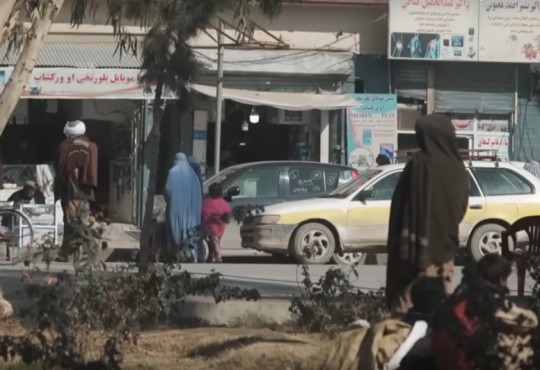
For years, Muslim fundamentalists have been aided by Pakistani (and American) intelligence services in their fight for control of Afghanistan. Like their predecessors in power between 1996 and 2001, the current Taliban are almost all from the Pashtun ethnic group, dominant in southern Afghanistan and neighboring north-western Pakistan. Today, the Pashtun Taliban are the masters of Afghanistan, and they in turn are supporting Muslim fundamentalists to take over Pakistan.
According to UN sources, the Afghan Taliban are currently providing increasing support to the Tehrik-i-Taliban Pakistan (TTP), a terrorist group operating mainly in Pakistan. Reports indicate that the Taliban have established eight new training camps in Afghanistan, where they provide training to TTP militants. The Tehrik-e-Taliban Pakistan (TTP) itself maintains close links with several affiliated terrorist groups: Al-Qaeda, Lashkar-e-Islam and Lashkar-e-Jhangvi. All of them are strengthening their operational capacity and strategic reach. The Afghan Taliban have close ties with regional affiliate Al-Qaeda in the Indian Subcontinent (AQIS), which is allied to the TTP. Relations between the two organizations date back to the early years of the TTP's formation. Al-Qaeda has provided financial, logistical and ideological support to the TTP, enabling it to carry out large-scale terrorist operations in Pakistan and Afghanistan. Al-Qaeda members were often integrated into the ranks of the TTP, facilitating operational cooperation between the two entities. Al-Qaeda training camps and operational bases in Afghanistan have also served as safe havens for TTP militants, enabling them to plan and execute cross-border attacks. Lashkar-e-Islam, based in the tribal regions of Pakistan, is mainly active in the Khyber district. The group has been involved in terrorist activities and clashes with Pakistani security forces. Links between the TTP and Lashkar-e-Islam are manifested in operational collaboration. Together, they have carried out coordinated attacks against Pakistani security forces and sought to extend their influence in the tribal regions. Lashkar-e-Jhangvi operates in Pakistan. It is mainly involved in attacks against the country's Shiite minority. The TTP maintains links with Lashkar-e-Jhangvi, taking advantage of its knowledge of the terrain. Together, they have carried out targeted attacks against civilians and religious minorities, exacerbating sectarian tensions in Pakistan. Collaboration between the TTP and Lashkar-e-Jhangvi threatens Pakistan's national security and stability.
This collaboration between the Afghan Taliban and fundamentalist groups in the region raises major security concerns, particularly for Pakistan. The TTP has already carried out numerous deadly attacks against Pakistani security forces and civilians. The continued support of the Afghan Taliban is likely to further aggravate the security situation in the region. In geopolitical terms, this cooperation highlights the pitiful results of the US invasion of Afghanistan and its historic support for the most radical jihadist groups. In the name of the fight against communism, Washington has supplied the bearded men with weapons, military training and funding for decades. The occupation of Afghanistan by over-equipped "boys", unprepared for the realities on the ground, until August 2021, only served to drive the population into the arms of the Taliban.
Having consolidated their power in Afghanistan, the Godless are now preparing to take over Pakistan. Bravo, Pentagon strategists…
1 note
·
View note
Text
Gearing Up for Glory: Weekend Sports Extravaganza!

Get ready for an action-packed weekend where sporting giants clash and rising stars take center stage! From fiery cricket battles to electrifying football duels and high-flying basketball encounters, there's something for every sports enthusiast. Cricket's Finest Face Off: West Indies vs. Australia (1st ODI): Can the Windies pull off an upset against the formidable Aussies at the MCG? (Prediction: Australia slight favorites) ০ Date : Friday, 02 February 2024০ Time : 09:30০ Venue : Melbourne Cricket Ground (MCG), Melbourne England vs. India (2nd Test): The series hangs in the balance as both teams vie for dominance in Visakhapatnam. (Prediction: Toss could be crucial) ০ Date : Friday, 02 February 2024০ Time : 10:00০ Venue : Dr. Y.S. Rajasekhara Reddy ACA-VDCA Cricket Stadium, Visakhapatnam Sri Lanka vs. Afghanistan (One-off Test): Home advantage on their side, will Sri Lanka prevail in this unique Test match? (Prediction: Sri Lanka favored) ০ Date : Friday, 02 February 2024০ Time : 10:30 BDT০ Venue :Sinhalese Sports Club, Colombo U19 World Cup Super-Six: India and Pakistan battle for supremacy, while other rising stars showcase their talent. (Prediction: Close contests) >India Under-19 vs Nepal Under-19 (Super Six - Match 7)০ Date : Friday, 02 February 2024০ Time : 14:00০ Venue : Mangaung Oval, Bloemfontein>Pakistan Under-19 vs Bangladesh Under-19 (Super Six - Match 10)০ Date : Saturday, 03 February 2024০ Time : 14:00০ Venue : Willowmoore Park, Benoni Football Fevers Pitch: La Liga: Barcelona welcomes Alaves, while Real Madrid faces their city rivals Atletico in a heated clash. (Prediction: Close calls in both matches) Barcelona vs Alaves০ Date : Saturday, 03 February 2024০ Time : 17:30 GMTReal Madrid vs Atletico০ Date : Sunday, 04 February 2024০ Time : 20:00 GMT Premier League: Chelsea, Manchester United, Arsenal, and more vie for crucial points in various Premier League showdowns. (Check team form for individual predictions) >Chelsea vs Wolves০ Date : Sunday, 04 February 2024০ Time : 14:00 GMT০ Venue : Stamford Bridge>Man Utd vs West Ham০ Date : Sunday, 04 February 2024০ Time : 14:00 GMT০ Venue : Old Trafford>Arsenal vs Liverpool০ Date : Sunday, 04 February 2024০ Time : 16:30০ Venue : Emirates Stadium>Brentford vs Man City০ Date : Monday, 05 February 2024০ Time : 20:00 GMT০ Venue : Gtech Community Stadium Ligue 1: PSG aims to maintain their lead as they face Strasbourg. (Prediction: PSG favored) >Strasbourg vs PSG০ Date : Friday, 02 February 2024০ Time : 20:00 GMT Basketball Buzzer Beaters: Heat vs. Wizards: A battle for Eastern Conference dominance unfolds in Washington. (Prediction: Heat slight favorites) >Heat vs Wizards০ Date: Saturday, 03 February 2024০ Time: 06.00 AM০ Venue: Capital One Arena Knicks vs. Pacers: Can the Knicks bounce back at home? (Prediction: Close contest) Knicks vs Pacers০ Date: Friday, 02 February 2024০ Time: 6:30 AM০ Venue: Madison Square Garden Magic vs. Pistons: Both teams searching for momentum in the Eastern Conference. (Prediction: Magic slightly favored) >Magic vs Pistons ০ Date : Monday, 05 February 2024০ Time: 02:00 AM০ Venue : Little Caesars Arena Remember, these are just a few of the exciting matches happening this weekend! Explore other leagues, tournaments, and local events to fuel your sporting spirit. Read the full article
0 notes
Text
BREAKING:
Heavy clashes have erupted on the border of Afghanistan and Pakistan.
Taliban soldiers started the clash by attacking the Pakistani Army near the Bajaur-Kunar border.
0 notes
Text
We didn't start a fire - 2023 Edition
Sudan mess, SpaceX, Myanmar war stress Nova Dam, Twitter X, elections take place everywhere Silicon Valley crash, earthquake in Afghanistan COVID safe, says the WHO, Russian invasion in year two
Javier Milei, Gaza strip, Gabon Coup, Gaylors get a grip Tusk wins, WGA, say goodbye to Feinstein Eye transplant, FIFA Cup, Afghan-Iran border clash TikTok ban, Il-76 crash, Nagorno-Karabakh clash
We didn't start the fire...
Typhoon in Taiwan, much unrest in Pakistan Xi Jinping, a 3rd term, Monkeypox isn't a threat Titan submarine, Turkey-Syria earthquake "Now and Then," going green, the UK ruled by Charles III
Generative AI, EU fascism on the rise MINUSMA, moon probe lands, Wagner group has to disband, Warrant out for Vladimir, Serbian shooter, climate fear United Auto Workers strike, Berlusconi finally dies
We didn't start the fire…
Ron Desantis Disney foes, FTC Amazon woes UFOs, Hawaii fires, Finland a member of NATO Fosse wins the Nobel Prize, so does Louis E. Brus, Barbenheimer, Bankman’s sink, democracy at its very brink
Kissinger, Freddy pain, Kenyan cult full insane Exxon checks, heatwaves drop, Hamas-Israel start a war January 6 Trial, German nuclear power
Money just for the elite, fights brewing in every street A new mass shooting each day. What else do I have to say?
We didn't start the fire…
0 notes
Text
19 Pakistani soldiers, 3 Afghan civilians killed in clashes between Afghan-Pak border forces
Heavy clashes erupted between Afghan and Pakistani border forces at border crossing points, killing 19 Pakistani soldiers and three Afghan civilians, local media reported on Saturday. The fierce clashes are ongoing in eastern Afghanistan’s Khost and Paktia provinces bordering Pakistan, TOLOnews reported, quoting a source from the Ministry of National Defense, as per Xinhua news agency. Afghan…
0 notes